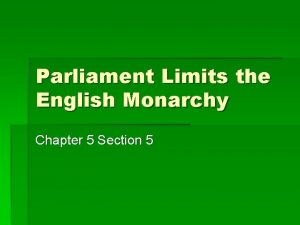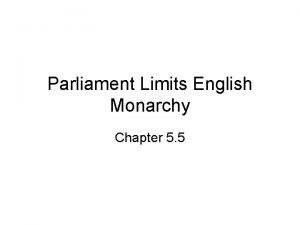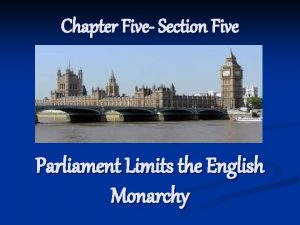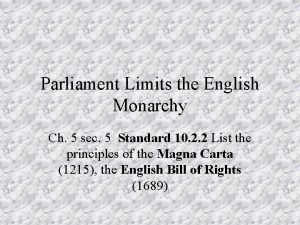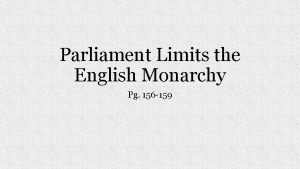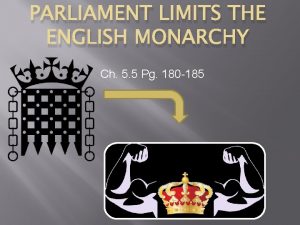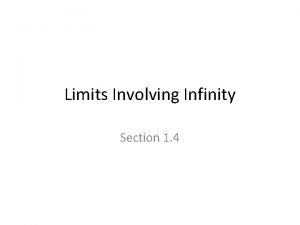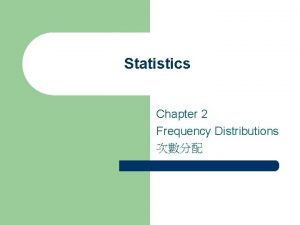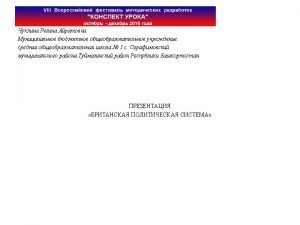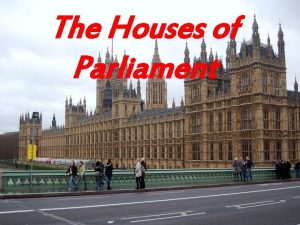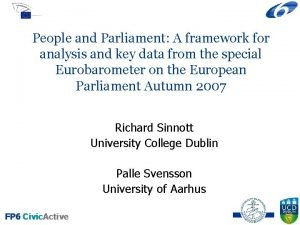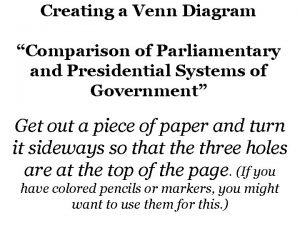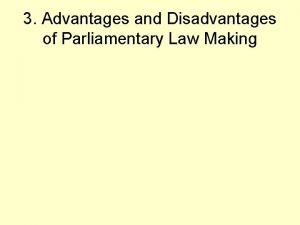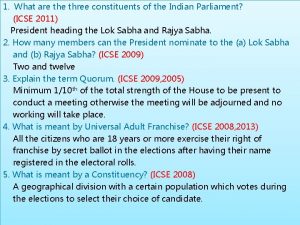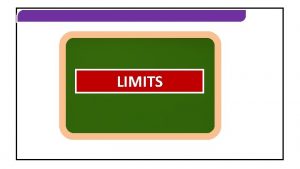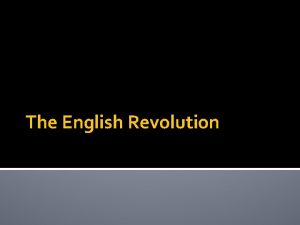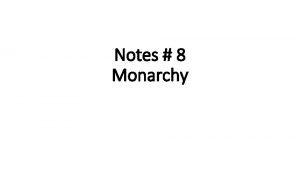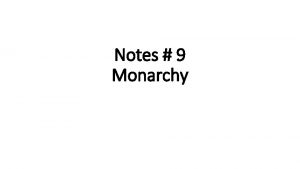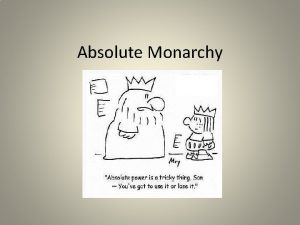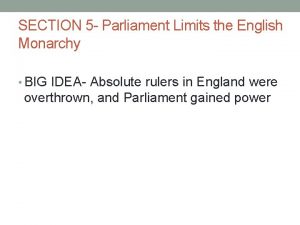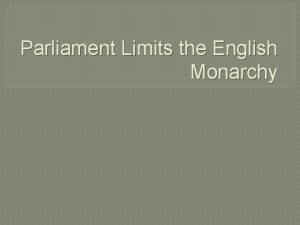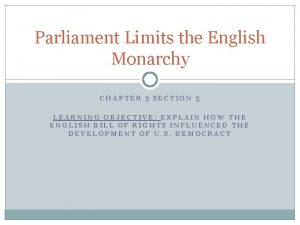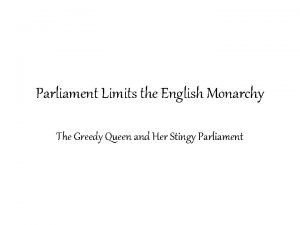PARLIAMENT LIMITS THE ENGLISH MONARCHY Ch 5 5














- Slides: 14

PARLIAMENT LIMITS THE ENGLISH MONARCHY Ch. 5. 5 Pg. 180 -185

Essential Question � How does a constitutional Monarchy differ from an absolute monarchy?

� � MAIN IDEA (Revolution): Absolute rulers in England were overthrown, and Parliament gained power WHY IT MATTERS NOW: Many of the government reforms of this period contributed to the democratic tradition of the U. S.

� King Charles I � Son of James I � Constantly at war with Spain and France Dissolves Parliament when it refuses to finance wars. Happens several times. 1628 Petition of Right �Forced to sign by Parliament �Ignored, but est. idea that LAW was higher than the king. 1629 Parliament dissolved �Charles I finances wars by taxing his people �Popularity plummets. Charles I Petition of Right

�Offends Puritans (Parliament) by not removing Catholic Rituals in Church �Scottish upset with Charles I and prepare to invade England. Forces Charles to turn to Parliament for $$. �Parliament passes law to limit King’s power Charles I tries to arrest members of parliament, escape Charles I Dissolving Parliament

English Civil War 1642 -1649 Royalist (Cavaliers) vs. Roundheads 1. Royalists: � 2. Support King Charles I Roundheads Puritan supporters of Parliament � 1645 Oliver Cromwell takes over Army. � 1647 Roundheads capture King � Tried and found guilty of treason, beheaded Beheading of Charles I

Cromwell’s Rule 1649 -1658 � � � Abolishes monarchy and the House of Lords Establishes commonwealth but abandons for a military dictatorship. Favored religious toleration for all Christians except Catholics. � 1649 English conquer Catholic Ireland Cromwell

Restoration � � Cromwell dies 1658 Parliament reestablished � Ask Charles II (Son of Charles I) to rule. Known as Restoration because Monarchy is restored � Habeas Corpus: If arrested had the right to seek judgment of guilt. �Set free if found not guilty �**Took away King’s ability to imprison subjects without reason. **

Cromwell’s Death � � � Charles II had Cromwell’s body dug up from Westminster Abby Dead body hung and beaten Head displayed on spike Head went missing (several Years later) Where is Cromwell’s head? Westminster Abby

Glorious Revolution 1688 � Charles II dies � No legitimate children � His brother James II (Catholic), next in line � King James II � Catholic, Church of England is Protestant � Appoints several Catholics to high office Parliament protests, James II dissolves it. � Wife gives birth to a son Catholic + Catholic = another Catholic King.

� Two groups are born in Parliament 1. Whigs: � Parliament members who oppose King 2. Tories: � Parliament members who supported King Whigs invite Mary (Protestant daughter of James II) and husband William to overthrow King and for the sake of Protestantism. � William leads army to London in 1688, James flees to France � � Also known as Bloodless Revolution. William and Mary

Limits of Monarchy � � Parliament establishes a constitutional monarchy: � Laws limit powers of the monarch English Bill of Rights 1. No suspending of Parliament Laws 2. Can not raise taxes without consent of Parliament 3. Freedom of speech within Parliament 4. No penalty for petitioning the King for grievances Cabinet System 1688 � Govt. officials who settled disputes between King and Parliament. Acted in the name of the King, but actually represented major party of parliament. Head of major party in Parliament Heads the Cabinet and is called the Prime Minister.

Military Dictator Assignment � After a long civil war your side is victorious. You have decided that the only way to maintain peace is to set up a military dictatorship. You may want to convert to a democracy at a later time, however you feel the country will fall apart without strict rules and leadership. Assignment In a 1 page essay write about how you would keep peace in your country. Examples: Make it illegal to possess weapons *Make it illegal to criticize the government. *You may want to suspend freedom of speech *Establish a curfew, enact martial law, etc. .

Warm Up � Why was Parliament and the people of England so irritated with King Charles I and what emerged out of it? � What are the reasons on why Parliament and Charles II disliked Cromwell so much? � Explain why the Glorious Revolution is also known as the Bloodless Revolution? � What document did King William and Queen Mary sign that limited their power? This document turned England from an absolute monarchy to a what?
 Chapter 5 section 5 parliament limits the english monarchy
Chapter 5 section 5 parliament limits the english monarchy Parliament limits the english monarchy
Parliament limits the english monarchy Parliament limits the english monarchy answer key
Parliament limits the english monarchy answer key Parliament limits the english monarchy
Parliament limits the english monarchy Parliament limits the english monarchy
Parliament limits the english monarchy Parliament limits the english monarchy
Parliament limits the english monarchy Limits involving infinity asymptotes
Limits involving infinity asymptotes Histogram polygon graph
Histogram polygon graph British monarchy symbol
British monarchy symbol Both the houses of parliament
Both the houses of parliament European parliament voter turnout
European parliament voter turnout Gdailymail
Gdailymail Presidential and parliamentary venn diagram
Presidential and parliamentary venn diagram Advantages and disadvantages of the house of lords
Advantages and disadvantages of the house of lords What are the three constituents of the indian parliament
What are the three constituents of the indian parliament
